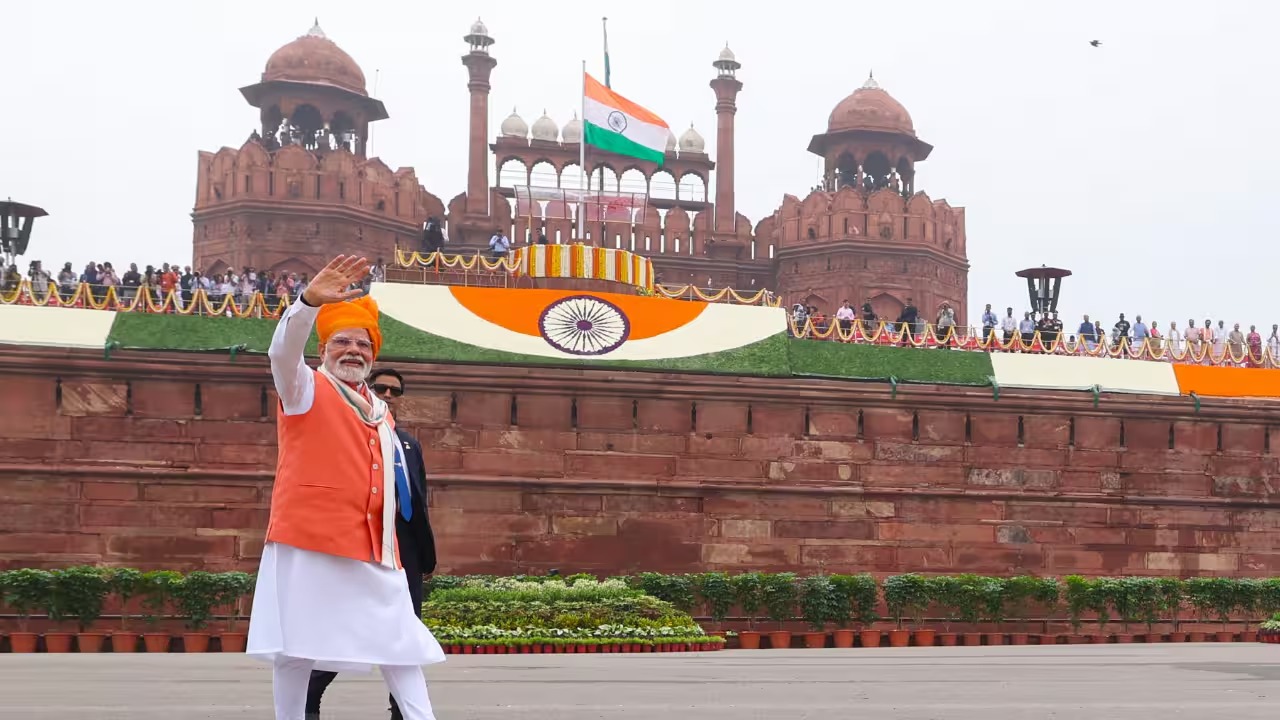
Follow WOWNEWS 24x7 on:

In a spirited Independence Day address from the Red Fort, Prime Minister Narendra Modi reignited the call for a self-reliant India, urging citizens, businesses, and political leaders to embrace the mantra of ‘Daam kam, dum zyada’—lower cost, higher value. The slogan, central to his ‘Vocal for Local’ campaign, aims to position India as a global manufacturing powerhouse by emphasizing quality, affordability, and indigenous innovation.
This year’s speech marked Modi’s twelfth consecutive Independence Day address, surpassing the record held by former Prime Minister Indira Gandhi. His remarks come amid escalating trade tensions with the United States, which recently imposed steep tariffs on Indian goods, prompting a renewed push for domestic resilience.
Key Takeaways From the Red Fort
- Modi emphasized that India must produce high-quality goods at competitive prices to strengthen its global image
- He called on influencers, traders, and political parties to promote indigenous products as a collective national mission
- The Prime Minister announced that India’s first made-in-India semiconductor chips will enter the market by the end of 2025
- Women’s self-help groups were praised for their growing role in entrepreneurship and exports
- Modi urged shopkeepers to visibly promote Swadeshi goods with signage and pride
Reclaiming Economic Sovereignty
Modi’s ‘Daam kam, dum zyada’ slogan is more than a catchy phrase—it’s a strategic directive aimed at reshaping India’s manufacturing ethos. He stressed that the world respects quality and that India must rise to meet global standards without inflating costs. This approach, he argued, would not only boost exports but also reduce dependence on foreign goods.
The Prime Minister reiterated his earlier ‘zero defect, zero effect’ manufacturing philosophy, encouraging industries to minimize environmental impact while maximizing product excellence. He also highlighted the government’s Production Linked Incentive (PLI) schemes and the National Manufacturing Mission, which support small, medium, and large enterprises in scaling up quality production.
Empowering Local Enterprises
Modi’s appeal extended beyond manufacturers to everyday consumers and retailers. He urged citizens to make indigenous products their first choice and encouraged traders to display signs reading “Yaha Swadeshi maal bikta hai” to foster pride in local goods. The Prime Minister emphasized that Swadeshi should be adopted not out of compulsion but as a symbol of strength and national pride.
He also spotlighted the transformative impact of women’s self-help groups, noting their evolution from marginalized collectives to key players in India’s entrepreneurial landscape. These groups, he said, are now contributing significantly to exports and local economic development.
Technology as a Catalyst
In a major announcement, Modi revealed that India is on track to launch its first domestically produced semiconductor chips by the end of 2025. With six units already operational and four more approved, the country is working in “mission mode” to establish itself in the high-tech manufacturing space. This move is expected to reduce reliance on imported chips and bolster India’s position in the global tech supply chain.
He described the 21st century as a “technology-driven century” and asserted that nations leading in innovation will shape the future. India’s semiconductor push, he said, is a critical step toward achieving that leadership.
A Call for Unity and Commitment
Modi’s address was not just a policy pitch—it was a rallying cry for collective action. He called on influencers, political parties, and citizens to transcend partisan divides and unite under the banner of ‘Vocal for Local.’ He reminded the nation that just as the previous generation fought for freedom, the current generation must commit to building a prosperous India.
His message was clear: economic independence, technological advancement, and social empowerment are the pillars of a strong and resilient India. By embracing indigenous products and innovation, the country can chart a path toward global prominence without compromising its values or sovereignty.
Sources: Moneycontrol, Times of India, MSN India




